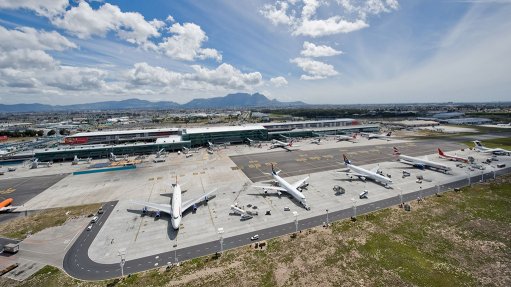
The Cape Town International Airport
Transport Minister Sindisiwe Chikunga has reported that State-owned Airports Company South Africa (ACSA) will invest R21.7-billion on airport infrastructure developments focused on refurbishments, improvements and statutory compliance over the next five years.
The aim is to enhance asset availability, airport safety and improved passenger experience across the country's airports.
She further announced during a March 5 briefing that the ACSA tariff would increase by 4.5% for the current financial year, by 10.3% in the 2024/25 financial year, 6.51% in the 2025/26 financial year, 6.16% in the 2026/27 financial year and 4.45% in the 2027/28 financial year.
The infrastructure investment will expand airport facilities and is the largest investment by ACSA since those made in preparation for the 2010 Soccer World Cup.
"The R21-billion in projects is mainly aimed at increasing capacity, with capital expenditure suspended during the Covid-19 impacted period," ACSA CEO Mpumi Mpofu added.
ACSA will develop a new Midfield Cargo terminal at the OR Tambo International Airport as a priority, given the demand and the later development of a Midfield Passenger Terminal, she said.
"The OR Tambo cargo terminal is a long-outstanding project and will see cargo handled on an international scale. OR Tambo holds awards as the best cargo airport in Africa and we will increase that capability, and help to facilitate intra-African trade," she said.
ACSA will also add six new bussing gates to the existing Terminal A, as well as expand the retail, seating, and holding lounge areas. Further, as part of Phase 2 of this project, a new mezzanine level will be constructed to improve circulation, seating and holding space.
Additionally, at the Cape Town International Airport, priority will be given to the reconfiguration and expansion of the domestic arrivals terminal to meet growing capacity needs.
ACSA will enlarge the meet and greet area, expand of the baggage claim area and add an additional baggage carousel, as well as expand the domestic departures lounge, retail spaces and ablution facilities. The project will also see the addition of three new contact gates and fixed boarding bridges.
ACSA will also start the development of the realigned runway development project, which is anticipated within the five-year period. This will increase the capacity of the runway to carry more aircraft, said Mpofu.
"The way the runway is positioned is restricting the number of aircraft it can handle and the realignment will increase its capacity to carry aircraft by 50%," she said.
"Over the next two years, ACSA plans to start expansion of the George Airport terminal as soon as possible and plans to follow this with a capacity expansion project at the Chief Dawid Stuurman International Airport, in Gqeberha, within a year or two," Chikunga said.
Further, King Shaka International Airport, in KwaZulu-Natal, will see the development of a hotel, as it is a relatively new airport, with a terminal expansion set for the 2027/28 financial year.
At King Phalo airport, in East London, the focus during the five-year period will be on expanding the departure lounge, relocating the security check point, upgrading of ablution facilities, improving retail options in the departure lounge, and adding offices and lounge space on the first floor, she said.
Meanwhile, the Air Traffic and Navigation Services (ATNS) made infrastructure investments of R128-million in the 2022/23 financial year in support of its goal of having reliable and stable air traffic management infrastructure, which ultimately boosts the aviation economy and contributes up to 3% to the national gross domestic product.
ATNS will also invest R155-million in its Aeronautical Fixed Telecommunication Network during the current financial year, as it pursues more essential infrastructure upgrades to ensure that it is future-fit to continue delivering on its national mandate, Chikunga said.
AUTOMATION
Further, sector regulator the South African Civil Aviation Authority (SACAA) has been pursuing automation and has been migrating its internal business processes to become a paperless entity.
"It has recently focused on external processes that will change the way the aviation industry transacts with the regulator. It has deployed various solutions, including a move away from a hardcopy booklet that is still used by many aviation States to identify licensed personnel, to a smart card licence, which has state-of-the-art security features," Chikunga said.
Further, SACAA has also launched an e-Services portal where operators can submit their certificate renewal applications online and also pay online.
Additionally, the Department of Transport will also introduce the e-Airwaybill within the South African air cargo industry to enhance efficiency and competitiveness.
"Systems such as real-time tracking systems, data analytics, automation, and artificial intelligence can streamline operations, improve visibility and optimise resource allocation. Embracing this digitalisation can only lead to greater transparency, cost savings and a better customer experience within this space," she said.
"The future of freight is digital. Therefore, a robust air cargo system is essential for global trade, speed, efficiency, connectivity, supply chain resilience, economic growth and the timely delivery of essential goods and services," Chikunga noted.